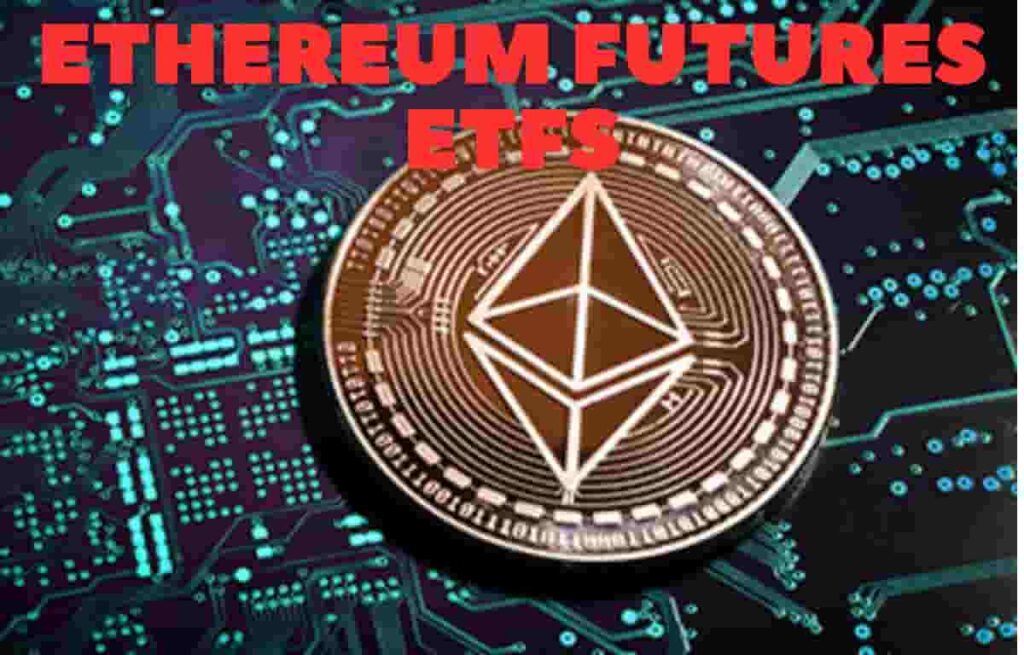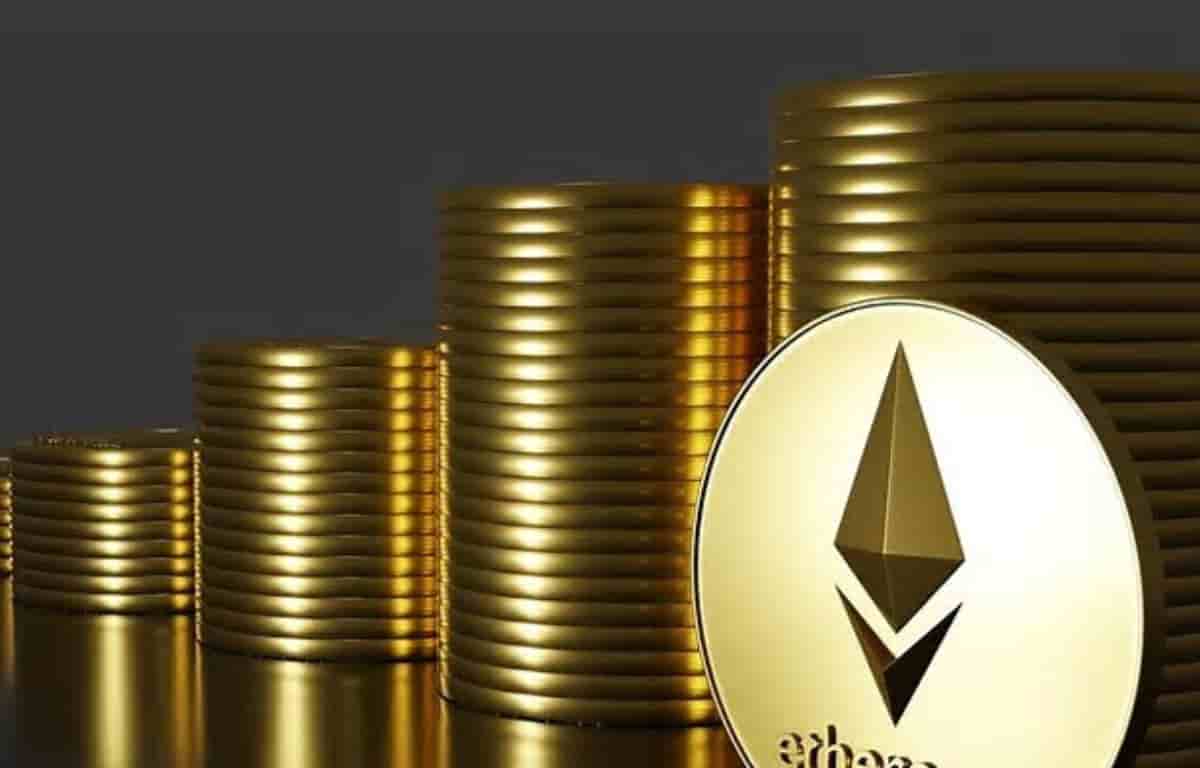As more people invest in cryptocurrencies, new chances are popping up for traders. The latest ETFs to hit the market are called Ethereum futures ETFs. One hot investment right now is called a “crypto futures ETFS.” You may have heard about regular ETFs for stocks and bonds, but applying this idea to crypto is still quite new. Keep Continue to peruse to figure out what they are and the way that they work. As it’s going to Strat soon in different platforms.
Key Points for ETFS:
1. Ethereum Futures ETFs: These are like bundles of future contracts for Ethereum packed into a single publicly traded fund.
2. Recent Launch: A bunch of Ethereum futures ETFs were launched on October 2, 2023. Even though this got a lot of attention, not many people are trading them yet.
3. Different Goals: Various Ethereum futures ETFs aim for different things. Some want to closely follow the price of Ethereum (ETH), so when ETH goes up or down, the ETF’s value does the same. Others want to make money when Ethereum’s price goes up.
Ethereum Futures Start Trading in the U.S. ETFs
Ethereum (ETH-USD) futures ETFs have begun trading in the United States for the first time. On Yahoo Finance Live, hosts Josh Lipton and Julie Hyman are keeping an eye on the crypto market, including bitcoin (BTC-USD), following the launch of several Ethereum futures ETFs.
Josh Lipton: ProShares, VanEck, and Bitwise have all introduced their products. Additionally, Grayscale has applied for approval to change its Ethereum trust into an exchange-traded fund (ETF). This is quite interesting, Julie.
Julie Hyman: I’m not sure about the answers to these questions. On one hand, there is an SBF trial about to start, and supporters of cryptocurrencies argue that fraud exists in any asset class, not just crypto. However, critics believe that cryptocurrencies are more prone to fraud due to their lack of regulation compared to other asset classes. This debate continues while these new products gain approval and begin trading.
So it’s an interesting time. Meanwhile, Bitcoin is seeing an increase in value today, even with the SBF trial approaching. However, Ethereum’s price is down. So these new products are facing challenges in today’s market. It’s uncertain how things will unfold. I should also mention that Grayscale Investments has applied to convert its Ethereum trust into an ETF, a similar move to what it’s been trying to achieve with its Bitcoin ETF.
Josh Lipton: We just saw the price of Bitcoin near $28,000, showing a strong rebound from its previous levels. However, it’s still far from its record high of $69,000.
It’s also interesting to note what venture investors are currently doing. These are the individuals who invest in private companies. According to Bloomberg, investments in cryptocurrency and blockchain projects by venture capitalists have decreased to around $7 billion this year, which is only a quarter of the investment levels seen in 2021 and 2022. In essence, venture capitalists are becoming more cautious.
Julie Hyman: This is happening at the same time that companies like Coinbase are actively engaging with regulators in Washington, D.C.
Josh Lipton: Indeed, there is a lot of excitement surrounding spot Bitcoin ETFs, especially among crypto enthusiasts.
Table of Contents
What Is an Ethereum Futures ETFS?
An Ethereum future ETFS is a special kind of fund that combines many future contracts for Ethereum into one publicly traded fund. These funds can make money in different market conditions. The prices of ETF shares go up and down depending on what people think the fund is worth.
The U.S. Securities and Exchange Commission (SEC) carefully watches over all ETFs. An ETF can only start trading its shares after getting approval from the SEC. The SEC began approving crypto futures ETFs in 2021 but has been very careful about allowing new ones. The very first Ethereum futures ETFs were finally released on October 2, 2023. While this has created a lot of excitement in the crypto world, not many people are trading Ethereum futures ETFs yet compared to regular stock ETFs and Bitcoin ETFs.
How Does an Ethereum Futures ETFS Work?
To understand how an Ethereum futures ETFS works, let’s look at an example.
Imagine an Ethereum futures ETFS that wants to make money when the crypto market goes down. The fund buys several options contracts that let it sell Ethereum for a set price in the future. As these options expire, the fund’s managers keep rolling the profits into more futures contracts to keep the fund going.
After creating this fund that bets against Ethereum, the managers divide it into shares to sell on an exchange. The share price depends on how many people want to buy them. If Ethereum prices start falling, the fund makes more money, so the shares become more valuable. If Ethereum prices rise, the shares become less valuable.
Making money when Ethereum’s price falls is just one example of how an ETF can work. Different Ethereum futures ETFs have different goals. Some aim to mimic Ethereum’s price closely, so when Ethereum goes up or down, the ETF’s value does the same. Others try to make money when Ethereum’s price goes up.
In the end, crypto investors can trade ETF shares just like they would with any other commodity. If the market conditions are good, they can make a profit. Many things can affect the value of a futures ETF, including how it’s managed, current Ethereum prices, expectations about future Ethereum prices, interest in trading Ethereum ETFs, and whether other ETFs offer better returns.
Benefits of Investing in an Ethereum Futures ETF
There are several advantages to choosing an Ethereum futures ETF as your investment option.
Ease of Use: Ethereum futures ETFs are a favorite among new investors because they take care of all the nitty-gritty details for you. You simply decide if you believe the market will go up, down, or stay steady, and then you purchase an Ethereum futures ETF share that aligns with your strategy. You don’t need to figure out how to buy options on your own, and you’re not required to constantly buy and sell them at the right moment. This type of investment is straightforward, convenient, and speedy.
Accessibility: Another remarkable aspect of investing in an Ethereum futures ETF is that it’s not confined to the world of cryptocurrencies. An Ethereum futures ETF can be traded on various markets that are open to the public. This means that investors can start profiting from cryptocurrencies without the need to create accounts on decentralized exchanges (DEXs) or set up their own crypto wallets. Ultimately, Ethereum futures ETFs often attract traditional traders who are not involved in the cryptocurrency market. This expanded openness drives generally speaking to a more extensive market with additional individuals inspired by Ethereum as a by and large.
Reduced Fees: When compared to buying Ethereum futures contracts individually or hiring a fund manager to invest in Ether on your behalf, an Ethereum futures ETF is highly cost-effective. The passive management style requires less money to operate the fund, and all the fees associated with options are included in the fund itself. Investors can simply buy and sell shares without worrying about additional fees to the individuals responsible for creating the futures contracts.

Challenges of Investing in an Ethereum Futures ETF
Although many individuals find investing in Ethereum futures ETFs appealing, it’s important to be aware of potential drawbacks associated with these funds.
Lower Chance of Significant Profits:
Ethereum futures ETFs are considered low-risk investments, but their returns or dividends tend to be on the lower side as well. Most people invest in futures ETFs for their stability, but this comes with some trade-offs. While the likelihood of losing all your money is reduced, the probability of your futures ETF making you a millionaire overnight is also quite low. Particularly if you’re skilled at conducting research and selecting the right cryptocurrency, investing in an actual asset may yield greater profits than investing in Ethereum futures ETFs.
Not a Liquid Investment:
In fact Technically, investors can sell Ethereum futures ETF shares at any time. However, this type of investment may not always be in high demand. Unlike Ethereum itself, there may not always be a large number of investors ready to purchase your ETF shares. Even if the futures ETF performs well, there may not be buyers willing to pay its full value. If you don’t have the patience to wait for a buyer, you might end up selling at a loss. In most cases, ETFs are not investments that can be instantly converted into cash at their full value.
Top Ethereum Futures ETFs
Now that the SEC has finally begun allowing Ethereum futures ETFs, traders have the opportunity to explore these funds more easily. Here are two of the most noteworthy ones currently available.
ProShares Ether Strategy ETF (EETH)
Known for its ProShares® Bitcoin Strategy ETF, ProShares® has launched the ProShares® Ether Strategy ETF (EETH), which is currently the largest Ethereum futures ETF in the market. It offers direct exposure to Ethereum and has an expense ratio of 0.95%. The ProShares Ether Strategy ETF is designed to mirror the performance of Ethereum, so its price moves in accordance with the price of Ether.
Bitwise Ethereum Strategy ETF (AETH)
he Bitwise Ethereum Strategy ETF (AETH) is an Ethereum futures ETF that also includes some Bitcoin futures. It provides a convenient way to get exposure to the most popular cryptocurrencies without having to focus on just one. Managed by Bank of New York Mellon, this Ethereum futures ETF has an expense ratio of 0.85%. Its goal is to track the movements of the crypto market.
Trading Ethereum Futures ETFs vs. Trading Ethereum
Ethereum futures ETFs and Ethereum tokens, despite both relying on the Ethereum network, have little in common. An Ethereum futures ETF offers various strategies for profit, while Ethereum tokens only generate profit when cryptocurrency prices rise. With Ethereum futures contracts, you can bet on overall market movements without needing to closely analyze specific price points. Compared to engaging in day trading of cryptocurrencies, an Ethereum futures ETF is often less risky and demands less active management from you.
However, owning Ethereum has advantages because it allows you to possess the underlying asset rather than just a contract share. You can easily convert Ethereum into cash, and its value can’t be eroded by third-party mismanagement. Actual Ethereum can also be used for transactions, making it more versatile than owning a futures ETF contract.
The Future of Ethereum Futures ETFs
When the SEC first approved an Ethereum futures ETF, it generated excitement among traders. However, it’s important to note that the trading volume for the new Ethereum futures ETFs was lower than anticipated. Some investors interpret this as a sign of oversaturation in the market. With numerous ETFs struggling to gain attention, it’s unlikely that many more will be introduced in the coming months.
Despite the oversupply, the future still seems promising for crypto ETFs. The launch of Ethereum futures ETFs saw higher-than-average trading volume compared to typical finance ETF launches. This suggests that crypto products are becoming an established part of the finance world. Even if some less popular Ethereum futures ETFs face challenges, the top-performing ones are likely to attract a significant user base.
Are Ethereum Futures ETFs Worth Investing In?
While Ethereum futures ETFs may not have garnered as much attention as Bitcoin futures ETFs, they are still worth considering as investments. They provide stability and lower risk, making them a valuable addition to a diversified portfolio. With an Ethereum futures ETF, you can make a profit even if Ethereum prices decrease. Additionally, ETFs make it easy to include crypto futures contracts alongside your traditional stocks and bonds, simplifying the investment process.
However, it’s important to be aware that the low trading volume suggests that these ETFs are not likely to experience sudden price surges. Share prices are unlikely to skyrocket, and less popular Ethereum and Bitcoin futures ETF options might face competition. Therefore, conducting thorough research before investing and avoiding overcommitting to a single Ethereum futures ETF is advisable.
The Bottom Line Of Content:
An Ethereum futures ETF can be a unique way of investing in cryptocurrencies without owning the actual assets. While it may not have the same intrinsic value as Ethereum tokens, a futures ETF is still a valuable addition to any crypto portfolio. With numerous Ethereum futures ETFs to choose from, investors have ample opportunities to explore this type of investment.
The Bitwise Ethereum Strategy ETF (AETH) is an Ethereum futures ETF that also includes some Bitcoin futures. It provides a convenient way to gain exposure to popular cryptocurrencies without focusing on just one. Managed by Bank of New York Mellon, it has an expense ratio of 0.85% and aims to track crypto market movements.
Ethereum futures ETFs and Ethereum tokens differ significantly. While Ethereum tokens generate profit when cryptocurrency prices rise, Ethereum futures ETFs offer various profit strategies, allowing investors to profit from market movements without analyzing specific price points. Futures ETFs often involve lower risk and require less active management.
The future for Ethereum futures ETFs looks promising, despite initial low trading volumes. These products are becoming an accepted part of the finance world, indicating growing interest in crypto investments. While some less popular ETFs may face challenges, top-performing ones are likely to attract a significant user base.
Ethereum futures ETFs are worth considering for investors looking to diversify their portfolios with stable, low-risk assets. These ETFs can generate profits even if Ethereum prices decrease, and they make it easy to add crypto futures contracts alongside traditional investments. However, it’s essential to conduct thorough research and avoid overcommitting to a single ETF due









